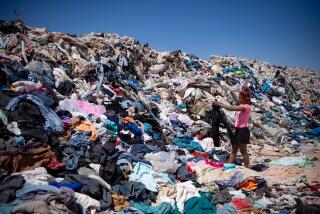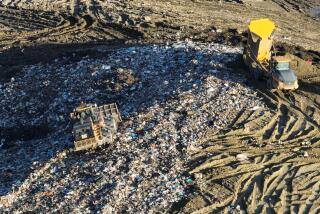Television review: ‘Trash Inc.’
Whether it’s banana peels or bald tires, frozen-food containers or soda cans, Americans make 250 million tons of garbage each year. What happens to all our castoffs after we haul them out to the curb is the subject of “Trash Inc.: The Secret Life of Garbage,” a one-hour documentary airing Wednesday on CNBC.
“I can’t tell you how many pairs of pants and shoes I’ve gone through, traipsing through these dumps and landfills,” said Carl Quintanilla, the Emmy-winning CNBC reporter who spent his summer wading through refuse from New York and Pennsylvania to Nevada, Hawaii and Beijing to learn where garbage goes, who handles it and what’s at stake economically and environmentally.
A 21st century gold mine, according to Quintanilla’s report, garbage is an epidemic and an opportunity. A $52-billion annual industry, garbage is not one-size-fits-all. Most of it is hauled to America’s 2,300 landfills — many of which make handsome profits for their operators and some of which further capitalize on their dump sites by piping “trash gas” to factories that use it to generate electricity.
“Trash Inc.” visits the largest U.S. landfill, Apex in Las Vegas, to show how landfills operate. Then it travels to Beijing and shows the flip side of the story: peering into a handful of the hundreds of illegal dumps that have cropped up on the city’s outskirts to handle the increasing waste flow of China’s burgeoning middle class.
Quintanilla rounds out the report with a focus on recycling and the many opportunities it presents, whether it’s plastic bottles being repurposed into textiles or waste food being turned into high-octane gas. About 80% of what Americans throw away is recyclable, according to “Trash Inc.” Just 28% of those throwaways, however, are recycled.
The idea for CNBC’s garbage documentary was born of the recession, Quintanilla said.
“We noticed that the stocks of publicly traded garbage companies managed to hang in there, and we wondered why,” he said. “What is it about garbage that makes it so consistent? Even with the recession, the level of garbage we put out as consumers has been pretty steady.”
More to Read
Inside the business of entertainment
The Wide Shot brings you news, analysis and insights on everything from streaming wars to production — and what it all means for the future.
You may occasionally receive promotional content from the Los Angeles Times.










